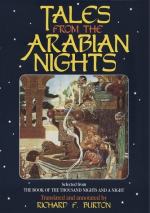[FN#70] Arab. “Amm"=father’s brother, courteously used for “father-in-law,” which suggests having slept with his daughter, and which is indecent in writing. Thus by a pleasant fiction the husband represents himself as having married his first cousin.
[FN#71] i.e. a calamity to the enemy: see vol. ii. 87 and passim.
[FN#72] Both texts read “Asad” (lion) and Lane accepts it: there is no reason to change it for “Hasid” (Envier), the Lion being the Sultan of the Beasts and the most majestic.
[FN#73] The Cairene knew his fellow Cairene and was not to be taken in by him.
[FN#74] Arab. “Hizam”: Lane reads “Khizam"=a nose-ring for which see appendix to Lane’s M. E. The untrained European eye dislikes these decorations and there is certainly no beauty in the hoops which Hindu women insert through the nostrils, camel-fashion, as if to receive the cord-acting bridle. But a drop-pearl hanging to the septum is at least as pretty as the heavy pendants by which some European women lengthen their ears.
[FN#75] Arab. “Shamta,” one of the many names of wine, the “speckled” alluding to the bubbles which dance upon the freshly filled cup.
[FN#76] i.e. in the cask. These “merry quips” strongly suggest the dismal toasts of our not remote ancestors.
[FN#77] Arab. “A’laj” plur. of “’Ilj” and rendered by Lane “the stout foreign infidels.” The next line alludes to the cupbearer who was generally a slave and a non-Moslem.
[FN#78] As if it were a bride. See vol. vii. 198. The stars of Jauza (Gemini) are the cupbearer’s eyes.
[FN#79] i.e. light-coloured wine.
[FN#80] The usual homage to youth and beauty.
[FN#81] Alluding to the cup.
[FN#82] Here Abu Nowas whose name always ushers in some abomination alluded to the “Ghulamiyah” or girl dressed like boy to act cupbearer. Civilisation has everywhere the same devices and the Bordels of London and Paris do not ignore the “she-boy,” who often opens the door.
[FN#83] Abdallah ibn al-Mu’tazz, son of Al-Mu’tazz bi ’llah, the 13th Abbaside, and great-great-grandson of Harun al-Rashid. He was one of the most renowned poets of the third century (A.H.) and died A.D. 908, strangled by the partisans of his nephew Al-Muktadir bi ’llah, 18th Abbaside.
[FN#84] Jazirat ibn Omar, an island and town on the Tigris north of Mosul. “Some versions of the poem, from which these verses are quoted, substitute El-Mutireh, a village near Samara (a town on the Tigris, 60 miles north of Baghdad), for El-Jezireh, i.e. Jeziret ibn Omar.” (Payne.)
[FN#85] The Convent of Abdun on the east bank of the Tigris opposite the Jezirah was so called from a statesman who caused it to be built. For a variant of these lines see Ibn Khallikan, vol. ii. 42; here we miss “the shady groves of Al-Matirah.”
[FN#86] Arab. “Ghurrah” the white blaze on a horse’s brow. In Ibn Khallikan the bird is the lark.




